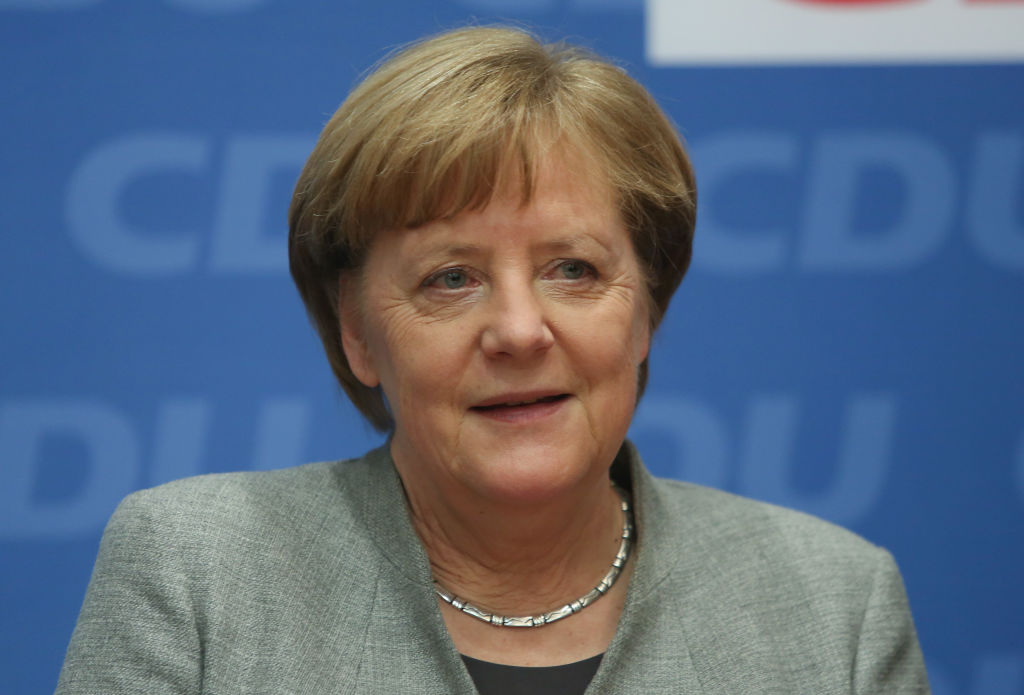Is there anything quite so ponderous as the German political process? It certainly provides a useful illustration of the gulf between the British and German way of doing things. Theresa May took only a few days to hatch a deal with the DUP to stay in power. By contrast, Angela Merkel has been trying to build a new coalition since September, and there’s still no end in sight.
The latest chapter in this epic saga was yesterday’s vote by Germany’s Social Democrats, on whether to approve the party’s preliminary coalition talks with Merkel’s Christian Democrats. After much agonised debate, SPD delegates voted in favour. So now, at long last, the SPD can finally enter formal coalition talks with the CDU. Merkel says she hopes to complete these negotiations by 12th February. Don’t hold your breath.
After polling just 20.5 per cent in September’s election (their worst result since the war) you’d think the SPD would jump at the chance to join a coalition government. In fact, that dreadful election result is the reason they’ve been agonising about it for so long. For the last four years they’ve been junior partners in a ‘grand coalition’ with the centre-right CDU – an unholy alliance which blurred their identity and eroded their core support.
Before September’s election, SPD leader Martin Schulz said he wouldn’t go back into government with the CDU – if he’d said otherwise, the SPD could well have done even worse. Leftist voters are fed up of voting SPD, only to put the CDU back into office. But now it looks like that’s exactly what they’re going to get – again. That’s the problem with proportional representation, as it’s practiced in Germany. Although the result is fair (in so far as the number of seats each party gets reflects their share of the vote), the final coalition deal is one over which Germany’s voters have no control.
Schulz favoured moving on to formal coalition talks, and the party eventually fell into line, but the vote was pretty close (362 for, 279 against) and this split reflects a generational divide within the party. One of his fiercest opponents was Kevin Kühnert, leader of the SPD’s Young Socialists, who argued against another coalition, and made the case for opposition. ‘It’d mean being a dwarf for now, so we can maybe be a giant again in future,’ he told SPD delegates (Alexander Dobrindt of the CSU, the CDU’s Bavarian sister party, had called protests by Kühnert’s Young Socialists a ‘dwarves rebellion’).
So what will be the final outcome of these interminable negotiations? Well, another grand coalition now looks more or less inevitable. Both party leaders have too much to gain to risk another breakdown, and much to lose. The prize for Merkel is another four years as Chancellor. The prize for Schulz is a role out of all proportion to his paltry slice of September’s poll.
Since that election the polls have shifted slightly in Merkel’s favour. Her CDU is up a point, to 34 per cent – Schulz’s SPD is down two points, to a wretched 18.5 per cent. Normally Merkel might be tempted to call his bluff and risk another election, but she knows these aren’t normal times. Germany’s new anti-immigration party, Alternative für Deutschland, is now Germany’s third biggest party, with 94 seats in the Bundestag. One in eight Germans voted AfD in September. In a new election, prompted by the failure of the CDU and the SPD to form a government, who knows how well they might do?
The only other alternative for Merkel is a minority government, something that hasn’t been seen in Germany since the war. If Schulz’s demands are too leftist and federalist for her to stomach, this might be her best bet. She could dare the Social Democrats to vote down her CDU government, prompting another election in which the SPD might well do even worse than before.
A British Prime Minister might opt for such a gamble, but as the last four months confirms, that’s not the German way. Germany’s horrific past has made Germans risk averse, even at the cost of stasis. That’s why Merkel has been able to hang on, and on, and on, against all political logic (Germany has had only eight leaders since the war). ‘Eine Neue Zeit Braucht Eine Neue Politik’ (New Times Need New Politics) was the slogan for the SPD’s Sunday summit. Germans thought they’d voted for something new in September, but it looks increasingly likely that they’ll end up with more of the same.






Comments